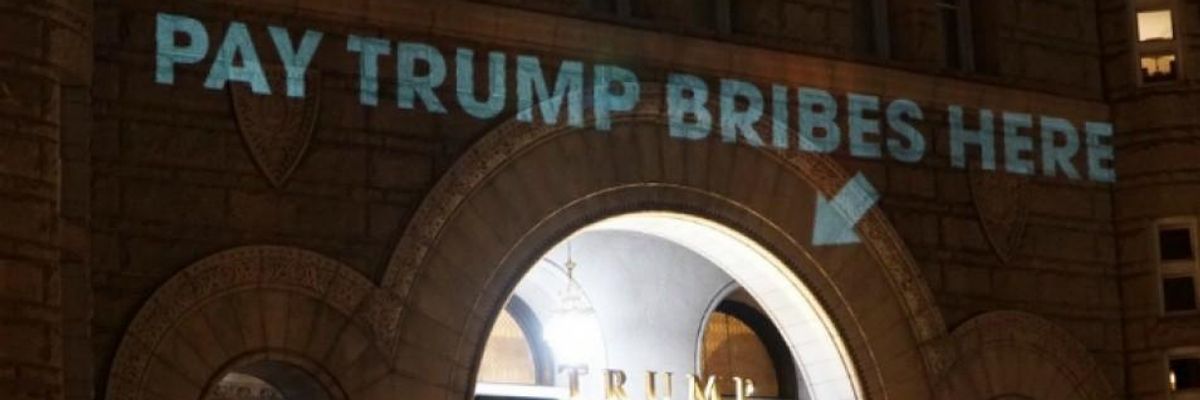The U.S. Supreme Court on Monday dismissed lawsuits related to whether former President Donald Trump illegally profited from his presidency in violation of the U.S. Constitution's emoluments clauses, eliciting swift condemnation from political commentators, ethics experts, and other Trump critics who have long demanded accountability.
"It's beyond clear that presidents should not be able to profit from their title or office. But instead of saying so, SCOTUS took the easy way out and ran out the clock," said Rep. Gerry Connolly (D-Va.), a senior member of the House Committee on Oversight and Reform and chair of the Subcommittee on Government Operations.
When Trump took office in 2017, he infamously refused to divest from his business empire and charged his adult sons--Don Jr. and Eric--and CFO Allen Weisselberg with overseeing the Trump Organization, which has been called "a rat's nest of hundreds of ambiguous limited liability companies."
Throughout his presidency, as special interest groups and foreign officials frequented his properties--especially the Trump International Hotel in Washington, D.C.--Trump faced allegations from competitors, lawmakers, and advocacy groups that he was violating the emoluments clauses (pdf).
The emoluments lawsuits in question were filed by the state of Maryland and the District of Columbia as well as hotels and restaurant in New York City and Washington, D.C. that "found themselves in the unenviable position of having to compete with businesses owned by the president of the United States."
Less than a week after Trump's presidency ended, the Supreme Court tossed Trump's challenge to lower court rulings that had allowed the lawsuits to proceed, ordered those rulings thrown out, and directed a pair of appeals courts to dismiss the suits as moot because Trump is no longer in office.
Walter Shaub resigned as director of the United States Office of Government Ethics after clashing with the then-president. A longtime critic of the twice-impeached Trump--who still faces a trial in the U.S. Senate for inciting a deadly insurrection at the U.S. Capitol--Shaub blasted the court's decision.
"That's insane. They're not moot," said Shaub. "He still has the money. When any other federal employee violates the emoluments clause they have to forfeit the money."
"If ever there were cases that fit the mootness exception these are they. The fact they arrived at the SCOTUS at the end of Trump's term demonstrate precisely why these actions can easily 'evade review.' As for 'capable of repetition,' Trump has stated his plan to run in [four years]," tweeted Sherrilyn Ifill, president of the NAACP Legal Defense and Educational Fund.
Ifill added that "had they held the cases to see if Trump is barred from holding office after Senate conviction, I could better understand. But even then, we need to know the contours of the emoluments clause for any president."
"The actual holding here isn't that the emolument cases are moot. It's that the president is above the law, because any attempt to bind the president through the courts will easily exceed the duration of the president's term in office, so don't bother," declared Will Stancil, a research fellow at the University of Minnesota Law School Institute on Metropolitan Opportunity.
"These suits were filed within months of Trump raking office; you could scarcely go faster," Stancil said. "So the rule, in practice, is that emoluments violations are allowed (unless the president is a Democrat, in which case the suits will somehow magically reach the Supreme Court in months)."
"This dismissal by a partisan Supreme Court is yet another reason why Congress must pass the Protecting Our Democracy Act, which would ensure that the emoluments clause of the Constitution is enforced and that Congress has standing to move quickly in the courts to enforce it."
--Sean Eldridge, Stand Up America
As CNN Supreme Court analyst and University of Texas law professor Steve Vladeck explained, "The Supreme Court's procedural order not only wipes away two lower court rulings, but it also orders dismissal of the entire dispute--leaving for some other time resolution of the many questions Trump's conduct raised about the emoluments clause."
"Ordinarily, the court pursues such a step only when the prevailing party moots a case while the appeal is pending--as opposed to here, where the disputes became moot because Trump's term ended," Vladeck added. "Today's orders suggest that the court is increasingly willing to invoke this doctrine to avoid highly charged political disputes, even if the mootness wasn't caused by the parties that won below."
Citizens for Responsibility and Ethics in Washington executive director Noah Bookbinder noted Monday that "CREW sued Donald Trump on his first day in the Oval Office for systematic violations of the emoluments clauses of the Constitution" and said his group was honored to work with everyone involved in these two cases.
"These two emoluments cases continued to move forward successfully, including wins in two federal appeals courts, through four years of the Trump presidency, despite advancing novel legal theories and having the weight of a presidential administration arrayed against them," he said. "This important litigation made the American people aware for four years of the pervasive corruption that came from a president maintaining a global business and taking benefits and payments from foreign and domestic governments. Only Trump losing the presidency and leaving office ended these corrupt constitutional violations stopped these groundbreaking lawsuits."
Stand Up America founder and president Sean Eldridge responded to the ruling by calling for democracy reforms to prevent future presidents from similar behavior, asserting that "Donald Trump spent the past four years shamelessly abusing the power of the presidency to enrich himself and his family."
"This dismissal by a partisan Supreme Court is yet another reason why Congress must pass the Protecting Our Democracy Act, which would ensure that the emoluments clause of the Constitution is enforced and that Congress has standing to move quickly in the courts to enforce it," Eldridge said. "Congress must act now to ensure that no future president can profit off the presidency."

